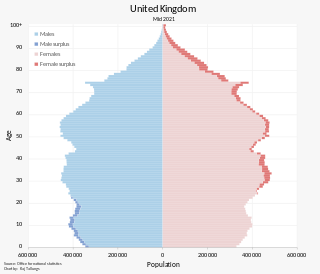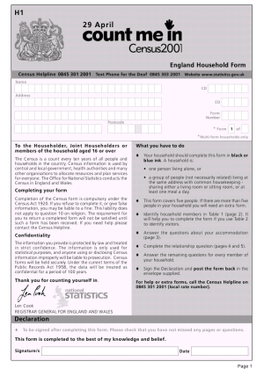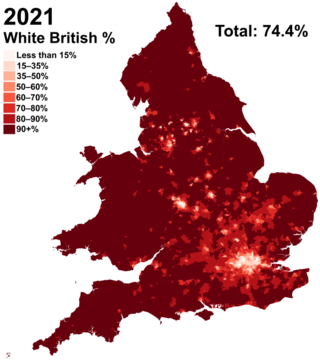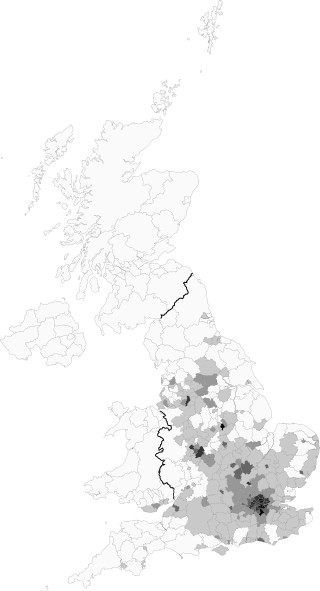Related Research Articles

The population of the United Kingdom was estimated at 67,596,281 in 2022. It is the 21st most populated country in the world and has a population density of 279 people per square kilometre, with England having significantly greater density than Wales, Scotland, and Northern Ireland. Almost a third of the population lives in south east England, which is predominantly urban and suburban, with 8,866,180 people in the capital city, London, whose population density was 5,640 inhabitants per square kilometre (14,600/sq mi) in 2022.

The demography of England has since 1801 been measured by the decennial national census, and is marked by centuries of population growth and urbanization. Due to the lack of authoritative contemporary sources, estimates of the population of England for dates prior to the first census in 1801 vary considerably. The population of England at the 2021 census was about 56,489,800.
Christianity is the dominant religion in the United Kingdom. Results of the 2021 Census for England and Wales showed that Christianity is the largest religion, followed by the non-religious, Islam, Hinduism, Sikhism, Judaism, Buddhism, and Taoism. Among Christians, Anglicanism is the most common denomination, followed by Catholicism, Presbyterianism, Methodism, Unitarianism, and Baptism. Results for the 2022 census in Scotland showed that 38.8% of the Scottish population identified as Christian, with 20.4% stating that the Church of Scotland is their main religion, whilst 13.3% stated their main religion was the Catholic church in Scotland.
The United Kingdom Census 1901 was the 11th nationwide census conducted in the United Kingdom of Great Britain and Ireland, and was done on 31 March 1901 "relating to the persons returned as living at midnight on Sunday, March 31st".

Coincident full censuses have taken place in the different jurisdictions of the United Kingdom every ten years since 1801, with the exceptions of 1941, Ireland in 1921/Northern Ireland in 1931, and Scotland in 2021. In addition to providing detailed information about national demographics, the results of the census play an important part in the calculation of resource allocation to regional and local service providers by the UK government.

The United Kingdom Census of 1841 recorded the occupants of every United Kingdom household on the night of Sunday 6 June 1841. The enactment of the Population Act 1840 meant a new procedure was adopted for taking the 1841 census. It was described as the "first modern census" as it was the first to record information about every member of the household, and administered as a single event, under central control, rather than being devolved to a local level. It formed the model for all subsequent UK censuses, although each went on to refine and expand the questions asked of householders.

White British is an ethnicity classification used for the White population identifying as English, Scottish, Welsh, Cornish, Northern Irish, or British in the United Kingdom Census. In the 2011 census, the White British population was 49,997,686, 81.5% of Great Britain's total population. For the United Kingdom entirely, due to different reporting measures within Northern Ireland which includes all those who identified as British with those who identified as Irish, an amalgamated total of 52,320,080 including those who identified as White Irish in Great Britain is given making up 82.8% of the population.

Mixed is an ethnic group category that was first introduced by the United Kingdom's Office for National Statistics for the 2001 Census. Colloquially, it refers to British citizens or residents whose parents are of two or more races or ethnic backgrounds. The Mixed or Multiple ethnic group numbered just under 1.8 million in the 2021 United Kingdom census or 2.7% of the total UK population.

The term Other White, or White Other, is a classification of ethnicity in the United Kingdom, used in documents such as the 2021 United Kingdom Census, to describe people who identify as white persons who are not of the English, Welsh, Scottish, Roma, Irish or Irish Traveller ethnic groupings. In Scotland, the term Other White is also used to refer collectively to those not of Scottish or Other British ethnicity, in which case it also includes those of a Gypsy, Roma, Irish or Irish Traveller background.

British Arabs are British citizens of Arab descent. They share a common Arab ethnicity, culture, language and identity from different Arab countries. Arabs also come from non-Arab countries as ethnic minorities.

Malaysians in the United Kingdom are British citizens who have full or partial Malaysian origin or descent and Malaysian citizens residing in the United Kingdom. The 2001 UK Census recorded 49,886 Malaysian-born people. The 2011 census recorded 62,396 people born in Malaysia living in England, 2,117 in Wales, 4,721 in Scotland and 705 in Northern Ireland. The largest concentrations of Malaysian-born residents were recorded in Greater London and South East England (11,331). The Office for National Statistics estimates that 75,000 Malaysian-born expatriates were residents in the UK in 2017.
Czechs in the United Kingdom refers to the phenomenon of Czech people migrating to the United Kingdom from the Czech Republic or from the political entities that preceded it, such as Czechoslovakia. There are some people in the UK who were either born in the Czech lands or have Czech ancestry, some of whom descended from Jewish refugees who arrived during World War II.
Lebanese people in the United Kingdom include people originating from Lebanon who have migrated to the United Kingdom and their descendants.

Since 1922, the United Kingdom has been made up of four countries: England, Scotland, Wales and Northern Ireland. The UK prime minister's website has used the phrase "countries within a country" to describe the United Kingdom.
The United Kingdom Census of 1861 recorded the people residing in every household on the night of 7 April 1861, and was the third of the UK censuses to include details of household members. The census was taken and recorded everyone living in a household on Sunday 7 April 1861. The 1861 format of the census was identical to the previous 1851 census, despite pressures for 'religious affiliation' questions to be included. This suggestion was rejected at the time.
The United Kingdom Census of 1881 recorded the people residing in every household on the night of Sunday 3 April 1881, and was the fifth of the UK censuses to include details of household members.

The 2021 United Kingdom census is the 23rd official census of the United Kingdom. Beginning in 1801, they have been recorded every 10 years. The 2021 censuses of England, Wales, and Northern Ireland took place on 21 March 2021, and the census of Scotland took place 364 days later on 20 March 2022. The censuses were administered by the Office for National Statistics (ONS) in England and Wales, by the Northern Ireland Statistics and Research Agency (NISRA) in Northern Ireland, and by the National Records of Scotland in Scotland. These were the first British censuses for which most of the data was gathered online. Two of them went ahead despite the COVID-19 pandemic, in part because the information obtained would assist government and public understanding of the pandemic's impact. The census-taking in Scotland was postponed, and took place in 2022 because of the pandemic.
The United Kingdom Census 1891 was a census of the United Kingdom of Great Britain and Ireland carried out on Sunday 5 April 1891. A question was added to record the number of rooms in a household, in response to concerns about overcrowding in cities. This was also the first census to employ women census takers and the first to ask in Wales about the ability to speak the Welsh language.
References
- ↑ "Census records". The National Archives. Retrieved 7 March 2018.
- ↑ 1801-1901. Office for National Statistics. Archived by The National Archives 28 January 2016. Retrieved 13 July 2017.
- ↑ "1871 England, Wales & Scotland Census". FindMyPast. Retrieved 15 December 2021.